This list is informed by my avocation as a hospice volunteer caregiver. One thing to note is that the information in several of these books have served to comfort hospice residents who expressed fear as their last days approached. For that reason alone, these could enrich anyone’s life.
1
Dr. Mannix is a longtime palliative care physician and, in addition to being deeply informed on the subject, she is a remarkably warm and caring person. She's on twitter, and is one of the loveliest people you will find there. If you are afraid of death or fearful of conversations about death or worried that you will say or do something around a dying loved one that you will regret, this is the book for you. She takes all of the otherness out of death and explains the process in a compassionate and realistic way, bringing the reader along the path with her. I can't say enough good things about this book. From With The End in Mind: “We are privileged to accompany people through moments of enormous meaning and power; moments to be remembered and retold as family legends and, if we get the care right, to reassure and encourage future generations as they face these great events themselves.”
2
This was the first book I ever read on the subject of death and dying, and it is also the book that I gave my mother to read toward the end of her sister's life when she was her sister's primary caregiver. My mother really had no relevant experience and she was afraid, and sure that she would do something wrong. Stephen Levine gave her great peace of mind. I should also mention that Levine comes from a Buddhist perspective, and my mother was a Baptist, but his writing and thoughts are so inclusive that she was not put off at all and was able to take his writing to heart.
3
When this book was first recommended to me, I got my hackles up over the idea that there is a metric to measure whether someone died "well" -- I was wrong -- Dr. Byock's concept of dying well comprises not dying in pain, and not dying alone (by which we mean "unsupported" -- certainly plenty of folks wait until everyone is out of the room to take their last breath). I gave this book to a hospice resident who was terrified of what his last days would be like, and I pointed to a specific chapter related to his specific condition. He was so comforted, and I think there is a chapter for everyone.
4
A beautiful and remarkable book. I'm sorry it's not better known. Although it makes me sad that the author only had the comfort of hospice for the last 10 days of her life, I felt while reading this that she illustrates beautifully that people who have a terminal illness aren't *dying* so much as they are *living*.
5
This is a lovely, lovely book that came to my attention because it won The Wellcome Book Prize in 2015. I don't know how Coutts did it, and I don't think she realizes the depth and universality of what she has written. I suspect she thinks she wrote about one family's experience. But there is something so heroic about her -- asking friends for what she needs, telling us about her emotional turmoil and her occasional frustration with her toddler, staying so deeply connected to her husband. She had a shit time with palliative care, for which I was sorry, and I was sorry too that she had to stumble to hospice out of luck and not because she was directed there, but I was so happy to see hospice, presented to her as failure or as unpredictable, become her friend and ally and, above all, to be the facilitator for what was right for the family, rather than imposing their own rules or structure on her. My experience of hospice in the best of circumstances is that it frees up the patient and the family to be truly present for one another without the distractions and drama of treatment, and plans, and goals, and fears of the unknown. I feel as though Coutts was able to be present with the unknown at the hospice because of how she was held there. This book is such a gift, and I know that I will read periodically over the years. I think I will always be shocked, however, that she didn't get a good cup of coffee at the hospice. Maybe they only had tea on offer.
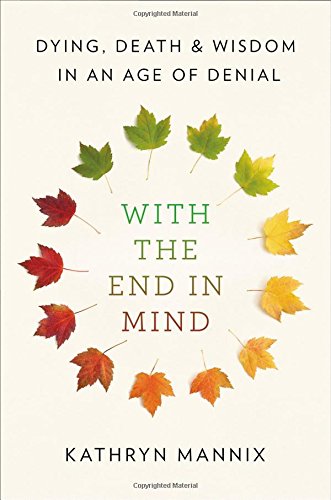
1
Dr. Mannix is a longtime palliative care physician and, in addition to being deeply informed on the subject, she is a remarkably warm and caring person. She's on twitter, and is one of the loveliest people you will find there. If you are afraid of death or fearful of conversations about death or worried that you will say or do something around a dying loved one that you will regret, this is the book for you. She takes all of the otherness out of death and explains the process in a compassionate and realistic way, bringing the reader along the path with her. I can't say enough good things about this book. From With The End in Mind: “We are privileged to accompany people through moments of enormous meaning and power; moments to be remembered and retold as family legends and, if we get the care right, to reassure and encourage future generations as they face these great events themselves.”
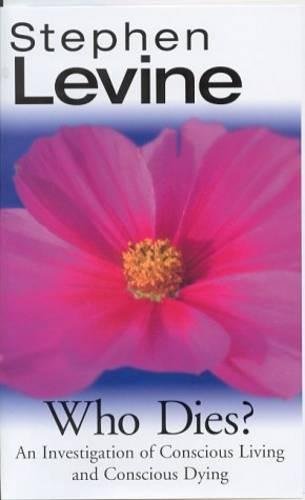
2
This was the first book I ever read on the subject of death and dying, and it is also the book that I gave my mother to read toward the end of her sister's life when she was her sister's primary caregiver. My mother really had no relevant experience and she was afraid, and sure that she would do something wrong. Stephen Levine gave her great peace of mind. I should also mention that Levine comes from a Buddhist perspective, and my mother was a Baptist, but his writing and thoughts are so inclusive that she was not put off at all and was able to take his writing to heart.
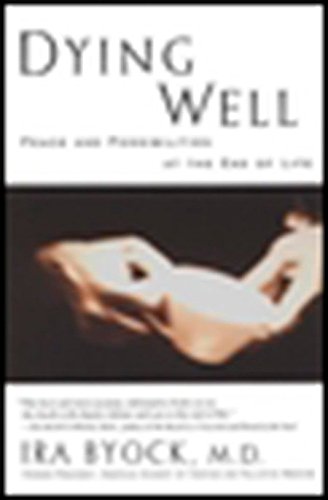
3
When this book was first recommended to me, I got my hackles up over the idea that there is a metric to measure whether someone died "well" -- I was wrong -- Dr. Byock's concept of dying well comprises not dying in pain, and not dying alone (by which we mean "unsupported" -- certainly plenty of folks wait until everyone is out of the room to take their last breath). I gave this book to a hospice resident who was terrified of what his last days would be like, and I pointed to a specific chapter related to his specific condition. He was so comforted, and I think there is a chapter for everyone.
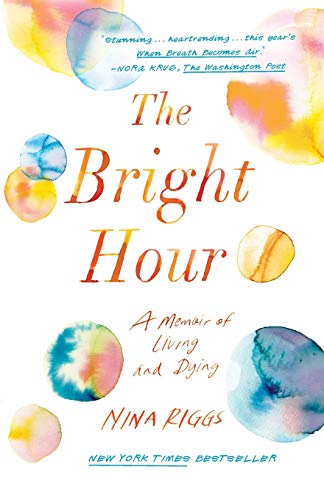
4
A beautiful and remarkable book. I'm sorry it's not better known. Although it makes me sad that the author only had the comfort of hospice for the last 10 days of her life, I felt while reading this that she illustrates beautifully that people who have a terminal illness aren't *dying* so much as they are *living*.
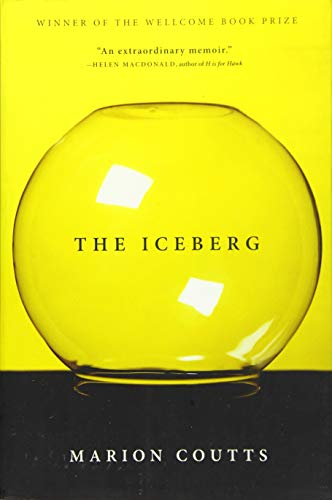
5
This is a lovely, lovely book that came to my attention because it won The Wellcome Book Prize in 2015. I don't know how Coutts did it, and I don't think she realizes the depth and universality of what she has written. I suspect she thinks she wrote about one family's experience. But there is something so heroic about her -- asking friends for what she needs, telling us about her emotional turmoil and her occasional frustration with her toddler, staying so deeply connected to her husband. She had a shit time with palliative care, for which I was sorry, and I was sorry too that she had to stumble to hospice out of luck and not because she was directed there, but I was so happy to see hospice, presented to her as failure or as unpredictable, become her friend and ally and, above all, to be the facilitator for what was right for the family, rather than imposing their own rules or structure on her. My experience of hospice in the best of circumstances is that it frees up the patient and the family to be truly present for one another without the distractions and drama of treatment, and plans, and goals, and fears of the unknown. I feel as though Coutts was able to be present with the unknown at the hospice because of how she was held there. This book is such a gift, and I know that I will read periodically over the years. I think I will always be shocked, however, that she didn't get a good cup of coffee at the hospice. Maybe they only had tea on offer.
© Five Books 2025